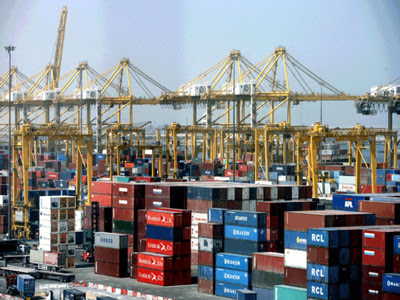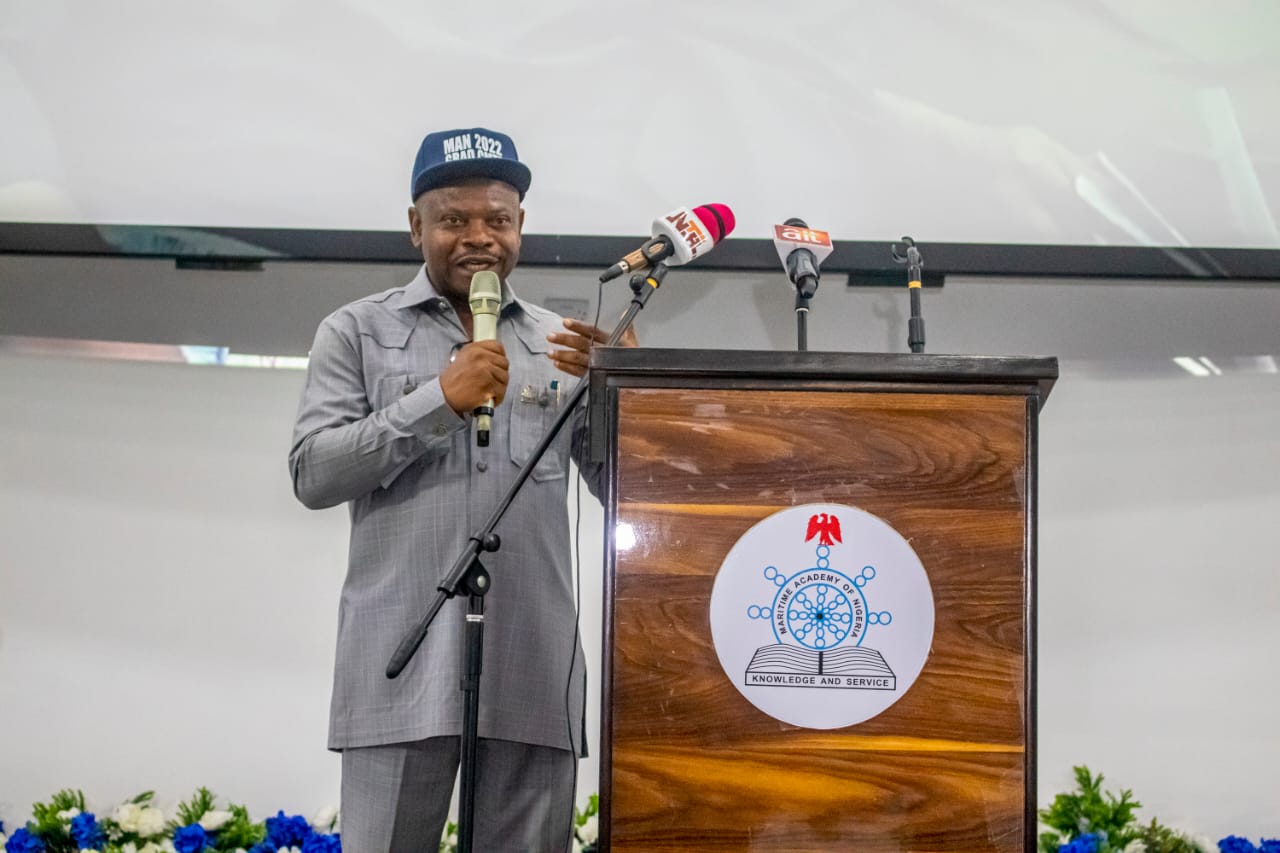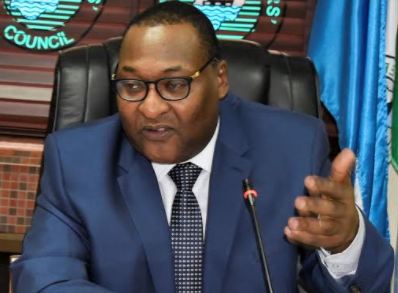The Nigerian Shippers’ Council (NSC)
at the weekend convened a meeting of stakeholders in the maritime industry to
review issues concerning the Federal Government’s action on border closure,
while stating its position of support for the government in the interest of the
nation’s economy.
at the weekend convened a meeting of stakeholders in the maritime industry to
review issues concerning the Federal Government’s action on border closure,
while stating its position of support for the government in the interest of the
nation’s economy.
The stakeholders including importers,
exporters, freight forwarders, customs brokers and officials of the Nigeria
Customs Service also expressed their support for the FG’s decision on closure
of the nation’s land borders.
exporters, freight forwarders, customs brokers and officials of the Nigeria
Customs Service also expressed their support for the FG’s decision on closure
of the nation’s land borders.
In his opening address, Executive
Secretary of the NSC, Mr. Hassan Bello, said the Council was in full support of
the FG’s action, as neighbouring countries had failed in respecting the ECOWAS
Protocol on trade rules and regulations.
Secretary of the NSC, Mr. Hassan Bello, said the Council was in full support of
the FG’s action, as neighbouring countries had failed in respecting the ECOWAS
Protocol on trade rules and regulations.
He said that countries have a duty to
protect trade in their countries and that border control was one such way of
doing so, rather than allow people do as they wish to the detriment of the
nation’s economy.
protect trade in their countries and that border control was one such way of
doing so, rather than allow people do as they wish to the detriment of the
nation’s economy.
Bello said a review of the ECOWAS
protocol had become needful as Nigeria alone was keeping to the rules, thus
making her a victim than a beneficiary. He, therefore, called on the
stakeholders’ support for the FG’s action on border closure.
protocol had become needful as Nigeria alone was keeping to the rules, thus
making her a victim than a beneficiary. He, therefore, called on the
stakeholders’ support for the FG’s action on border closure.
“Remember that the federal government just
signed the African Continental Free Trade Agreement (ACFTA). We have had every
economist pushing the ECOWAS protocol. We have to review this protocol because
Nigeria seems to be a victim rather than beneficiary. There are certain things
we allow to happen and those we should not.
signed the African Continental Free Trade Agreement (ACFTA). We have had every
economist pushing the ECOWAS protocol. We have to review this protocol because
Nigeria seems to be a victim rather than beneficiary. There are certain things
we allow to happen and those we should not.
“It is our duty to support what
customs is doing and it is also our duty to proffer solution. NSC is a trade
facilitator just like Customs. So we have been involved in the management of
the corridor, the Lagos Abidjan corridor.
customs is doing and it is also our duty to proffer solution. NSC is a trade
facilitator just like Customs. So we have been involved in the management of
the corridor, the Lagos Abidjan corridor.
“We have presence at the Seme border
so we know all the issues going on, we know how we have been taken advantage on
and we are in support of what is going on now. For long, Nigeria has been
taking things lightly, we are often called a big brother and at the same time
we are turned to a dustbin where everything is dumped,” Bello said.
so we know all the issues going on, we know how we have been taken advantage on
and we are in support of what is going on now. For long, Nigeria has been
taking things lightly, we are often called a big brother and at the same time
we are turned to a dustbin where everything is dumped,” Bello said.
Bello expressed satisfaction that the
nation’s ports were now experiencing increased activities as many importers now
use the ports, a development will create more jobs locally and improve revenue
from imports.
nation’s ports were now experiencing increased activities as many importers now
use the ports, a development will create more jobs locally and improve revenue
from imports.
While the stakeholders also supported
the FG’s action, they said that government should have notified them over a
period of time to enable them evacuate goods that are currently trapped in the
face of the border closure.
the FG’s action, they said that government should have notified them over a
period of time to enable them evacuate goods that are currently trapped in the
face of the border closure.
However, some freight forwarders said
the notice ought to have been given to the stakeholders before the closure, to
evacuate items that are currently trapped in the borders.
the notice ought to have been given to the stakeholders before the closure, to
evacuate items that are currently trapped in the borders.
Speaking on that occasion, maritime
matters analyst, Otunba Kunle Folarin, supported the closure of the nation’s
borders and faulted the lack of compliance to set rules and regulations from
the neighbouring countries.
matters analyst, Otunba Kunle Folarin, supported the closure of the nation’s
borders and faulted the lack of compliance to set rules and regulations from
the neighbouring countries.
He said that Nigeria had suffered a
one-sided relationship in the regard of compliance with trade within ECOWAS, as
the nation had experienced huge revenue losses due to smuggling activities.
one-sided relationship in the regard of compliance with trade within ECOWAS, as
the nation had experienced huge revenue losses due to smuggling activities.
Also speaking on need for compliance
with trade agreements, Managing Director of the Inland Container Nigeria
Limited (ICNL), Mr. Issa Yusuf, supporting the border closure, agreed that it
was time for Nigeria to actually ensure that neighbouring countries complied as
provided in the trade agreements.
with trade agreements, Managing Director of the Inland Container Nigeria
Limited (ICNL), Mr. Issa Yusuf, supporting the border closure, agreed that it
was time for Nigeria to actually ensure that neighbouring countries complied as
provided in the trade agreements.
He argued that government should have
given notice within a period before the border closure, to avoid the sufferings
being faced by legitimate business owners in Nigeria.
given notice within a period before the border closure, to avoid the sufferings
being faced by legitimate business owners in Nigeria.
In his summation, the Deputy
President of the Association of Nigerian Licensed Customs Agents (ANLCA), Mr.
Kayode Farinto, welcomed the closure, saying the action was long over-due.
President of the Association of Nigerian Licensed Customs Agents (ANLCA), Mr.
Kayode Farinto, welcomed the closure, saying the action was long over-due.
He added that with the border
closure, the ports would experience increased activities, thus creating more
jobs locally and a reduction in smuggling.
closure, the ports would experience increased activities, thus creating more
jobs locally and a reduction in smuggling.
Farinto used the occasion to charge
government on the need for developing infrastructure at the ports, as he called
attention to the increased charges by truck owners who now charge N500,000 to
deliver a container from Apapa to Ikeja.
government on the need for developing infrastructure at the ports, as he called
attention to the increased charges by truck owners who now charge N500,000 to
deliver a container from Apapa to Ikeja.
He further urged the federal
government to review the current tariff on imported vehicles which is about 70
percent for new ones.
government to review the current tariff on imported vehicles which is about 70
percent for new ones.
Founder of the National Association
of Government Approved Freight Forwarding (NAGAFF), Dr. Boniface Aniebonam who
also welcomed the closure said the problem has been with poor communication.
of Government Approved Freight Forwarding (NAGAFF), Dr. Boniface Aniebonam who
also welcomed the closure said the problem has been with poor communication.
Aniebonam who commended the NSC for
convening the meeting to brief stakeholders on the closure said Nigerians ought
to know the truth about the closure.
convening the meeting to brief stakeholders on the closure said Nigerians ought
to know the truth about the closure.
He called on other agencies of
government to join the NSC in explaining to stakeholders on the benefits of the
closure, Aniebonam bluntly said that whoever does not support the government
was unpatriotic.
government to join the NSC in explaining to stakeholders on the benefits of the
closure, Aniebonam bluntly said that whoever does not support the government
was unpatriotic.
He pointed out that Section 19-b of
the Customs Act gives the Service the power to shut the borders, blaming the
neighbouring countries for breaching ECOWAS protocol that led to the latest
development.
the Customs Act gives the Service the power to shut the borders, blaming the
neighbouring countries for breaching ECOWAS protocol that led to the latest
development.
The NAGAFF founder who observed that
the closure of the border was a kind of indictment on those manning the borders
said it was time for them to wake up to their responsibilities.
the closure of the border was a kind of indictment on those manning the borders
said it was time for them to wake up to their responsibilities.
“If you have bad neighbor, you cannot
be sleeping. We should not reopen our borders until we get our neighbours to
right the wrongs. We need to support government but government also needs to do
what it ought to do”, Aniebonam said.
be sleeping. We should not reopen our borders until we get our neighbours to
right the wrongs. We need to support government but government also needs to do
what it ought to do”, Aniebonam said.
Concerned about the fate of importers who have genuine goods trapped at the borders, other stakeholder appealed for intervention from the government to allow some of the goods to be cleared, to save the importers the burden of huge losses as they had borrowed money from the banks.

































































